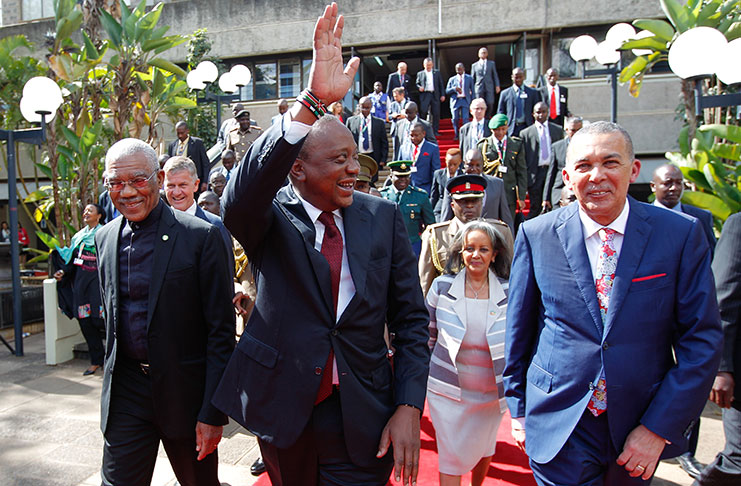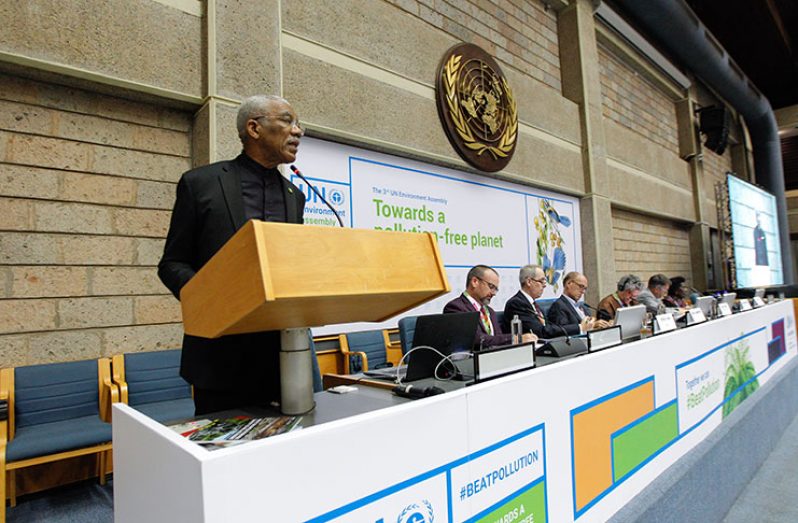…Pres. Granger tells UN forum citizens must be at heart of development of natural resources
PRESIDENT David Granger has reiterated that citizens must come before any profits as the world’s natural resources are the patrimony of all humanity. He was at the time addressing the high-level event on Combating Pollution in the Extractive Industries at the United Nations Environment Assembly in Nairobi, Kenya.
The Guyanese leader also used the opportunity to propose a three-pronged approach, which can help primarily small states with their fight against pollution and protection of the environment. “People, therefore, must be at the heart of the development of our natural resources. People must come before profits. The pursuit of profits has been accompanied, over the past century, by an exponential increase in extractive industries.
This expansion, however, has aggravated environmental damage, which can have a long-lasting and harmful negative impact “…on human dignity and well-being”,” the President said.

The Head of State said that pollution in the extractive industries threatens environmental security and it increases human vulnerability to human-induced environmental degradation and impacts on human security. While extractive industries have made inestimable contributions to the economies of low-income and middle-income countries, the President said that these measurable economic benefits are associated with air pollution, biodiversity loss, freshwater and oceanic contamination, greenhouse-gas emissions, land degradation and resource depletion.
“Pollution, within extractive industries, threatens human well-being and life. It can undermine production, impair human health and damage the physical environment. Environmental security, therefore, is a cross-cutting concern with economic, political and social implications. Combatting pollution in extractive industries requires a holistic response,” he said.
On this note, the Head of State said that Guyana is prepared to play its part and is pursuing a holistic approach to the exploitation of its natural resources. “Guyana’s ‘Green State Development Strategy’ will become our blueprint for moving towards becoming a ‘green state.’ The ‘green state’ will exemplify the policy of placing people before profits.
The ‘green state’ will demonstrate how our extractive industries – bauxite, diamond and gold mining and logging – can be aligned with the protection of our environment, the preservation of our biodiversity and the promotion of the generation of energy from renewable sources. The ‘green state’ will become a model of environmental stewardship. It will demonstrate the signal role which a small state can play in protecting the world’s air, water and land from the threat of pollution,” he said.
President Granger reminded that Guyana cannot do it alone and requires international cooperation, international organisation and information, education and communication. “International cooperation should be strengthened to ensure that states, particularly small states, can benefit from transfer of technologies and access to international financing to support programmes to reduce pollution. Guyana looks forward to increased international cooperation between large and small states in combatting pollution.
Guyana recognises the need for an international organisation to drive greater international cooperation, collaboration and coordination to ensure a pollution-free planet and Information, education and communication must be extended through a sustained campaign aimed at raising awareness of the urgency of eliminating pollution at the level of citizen, household and community,” he said. Guyana has already begun taking steps to reduce the level of pollution in its extractive industries.
In September the Head of State travelled to Geneva, Switzerland, for the first Conference of the Parties (COP) to the Minamata Convention, where he reassured the international community that Guyana will not only reduce its use of mercury in the mining industry, but will work to eliminate the practice.
The United Nations Environment Assembly is not only the highest authority on the Environment within the United Nations. It is also an ideal platform for bringing together different stakeholders: Governments, Civil Society/Major Groups, Science and the private sector to enable them to work together to tackle the shared and unprecedented challenges the world is facing.


.jpg)











